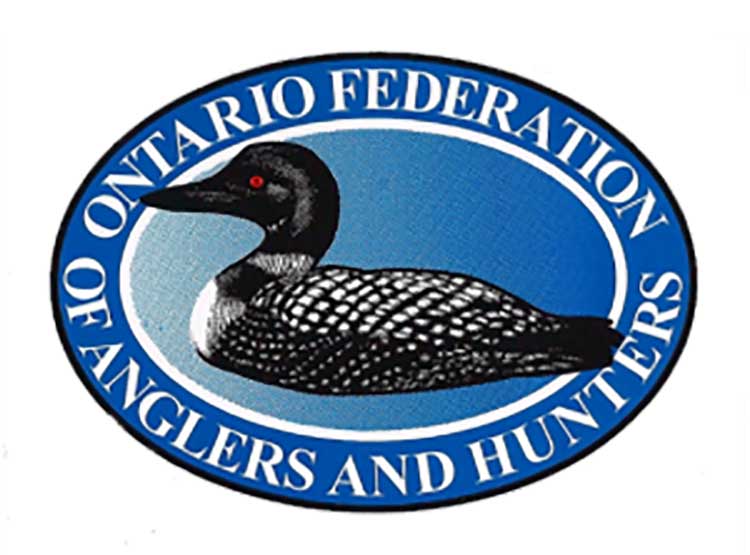ONTARIO – The Ontario Federation of Anglers and Hunters (OFAH) is in support of a proposal by the Ministry of Northern Development and Mines, Natural Resources and Forestry (MNRF) to establish a financial penalty being imposed on hunters for failing to submit a mandatory hunting report.
“The goal of the OFAH is supporting sustainable wildlife management and limiting barriers to hunting,” said Keith Munro of OFAH when contacted by The Expositor last week.
A ministry environmental bill of rights (EBR) posting of July 9 explains, “we are proposing to introduce an automatic financial penalty for hunters who fail to submit their mandatory hunter report(s), as required by the regulations. This penalty would provide an alternative tool to promote and improve hunter reporting compliance and improve reporting data.”
“Information provided by hunters through mandatory hunter reporting is important for managing wildlife in Ontario. It specifically helps us monitor wildlife populations, tag quotas and determine the availability of additional tags, make changes to seasons and bag limits and inform management policies,” the EBR reads.
“All hunters that purchase or are issued a tag to hunt elk, deer, bear, wild turkey and wolf/coyote (in Wildlife Management Units where a tag is required) and any hunter issued a licence to hunt moose must complete a hunter report. Hunters are required to complete a hunter report even if they did not participate in the hunt or harvest an animal. Generally, reports must be submitted within 14 days following the end of the last hunting season for that species,” the EBR continues.
It was pointed out, “Ontario’s hunters have been very responsive to the mandatory hunter reporting requirements that were introduced in 2019. In 2020, the ministry observed an 84 percent compliance rate across all species. There were approximately 60,000 non-compliance reports (approximately 16 percent). Increased hunting reporting compliance leads to improved data and may lead to increased opportunities for hunters in some areas.”
Hunters who fail to report or who provide false or misleading information are currently subject to penalties, including fines and possible restrictions on their ability to purchase a licence or tag the following year.
“Experience in Ontario with previous hunter reporting requirements for certain species has shown that hunter reporting compliance rates deteriorate over time if penalties are not applied to demonstrate the importance of this information. It is important to maintain high compliance rates, which results in high quality of data to support management decisions,” the EBR continues.
“The ministry is proposing an alternative tool to promote and improve hunter reporting compliance and improve reporting data. The ministry is proposing to charge a mandatory financial penalty for hunters who fail to submit their hunter reports. The financial penalty would be automatically applied to the hunter once the fish and wildlife licencing system detect the report has not been submitted by the deadline. They would be required to be paid as part of (or prior to) the hunter’s next purchase of the relevant product (generally in the following year).”
The fine, “would be based on each individual reporting requirement (i.e., if a hunter fails to submit multiple reports they are charged a fee for each). The fines would persist on the hunters until they are paid and would not expire.”
“The financial penalties would be a standard fee, consistent across each individual reporting requirement. The fee would be the same whether the hunter is an Ontario resident or a non-resident. The ministry is seeking input on a proposed penalty in the range of $15-35 dollars. The ministry recognizes that if the fee is set too high, it may be viewed as more harsh than preventing a hunter from purchasing a licence or tag and may create financial barriers to participation in certain hunting activities And, if the fee is set too low, it could be viewed as an alternative to reporting and not provide the necessary incentive for hunters to submit future reports.”
Under the proposal the ministry would maintain a graduated penalty approach; if a hunter failed to submit a hunter report in two consecutive years for the same species, they would be prevented from purchasing the relevant draw application, licence or tag the following year.
“The ministry recognizes that there may be some legitimate circumstances that prevent a hunter from submitting their hunter report, such as a sudden injury, illness, or an error in the fish and wildlife licencing service. The ministry would maintain a process to consider waiving the penalty in very limited, exceptional circumstances,” the proposal notes.
The anticipated outcome of the proposal is that compliance rates with hunter reporting requirements will continue to improve and are maintained over time at a high level. This would provide improved reporting information to support wildlife management, similar to the system preventing a purchase in the following year, the proposal would provide a more efficient method of promoting compliance that reduces burden associated with time consuming and costly investigations or prosecutions (similar to the system lockout penalty that prevents a hunter from purchasing a licence or tag).
The anticipated environmental consequences of the proposal are positive, the ministry suggests. The proposal is intended to improve hunter reporting data which is used to support sustainable wildlife management. Revenue generated from the proposal would also be directed to the ministry fish and wildlife special purpose account which supports the delivery of fish and wildlife management programs.
The ministry proposal reads, “the anticipated economic consequences are neutral. Hunters who fail to report and are charged the financial penalty may view the proposal negatively. Some hunters who hunt certain species more casually (i.e. purchasing a licence/tag in the event the opportunity for harvest arises while they are actively hunting other species) may choose not to purchase licences and pay the fee for those species. However, the ministry’s hunter reporting program is widely supported and the proposal may generate some revenue to support fish and wildlife management programs.
The proposal does not pose new administrative costs to businesses.
“OFAH supports providing sustainable wildlife and mandatory reporting is crucial for wildlife management,” said Mr. Munro. “We have seen and MNRF numbers indicate a vast number of hunters, 84 percent do fill out the surveys.”
“One thing we’ve seen over time is that without meaningful and enforced penalties the (completion of hunting reports by hunters) decreases,” said Mr. Munro. “We are pleased the ministry is looking at these new proposal options.”
Mr. Munro added that the ministry proposal, “will be a topic of discussion of the OFAH big game advisory committee which is made up of representatives from across the province.”





